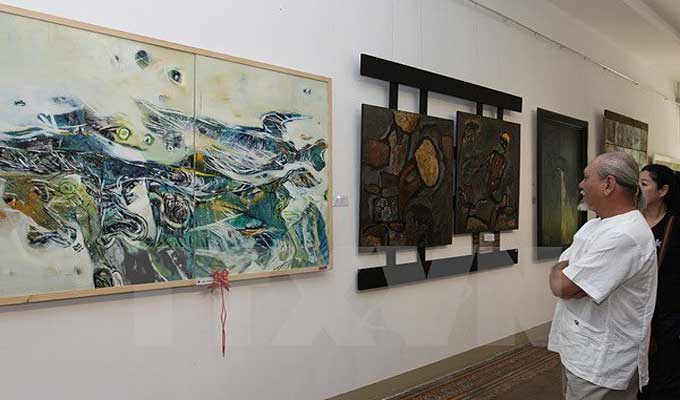A cultural programme entitled ‘The story of Vietnamese lacquer painting’ was held at Kim Ngan Temple, 42-44 Hang Bac Street last weekend.

The programme’s aim is to promote and honour traditional lacquer painting, the work of making it and its current development.
The programme is coorganised by the Ha Noi Old Quarter Board of Management, Ha Noi Intermediate Vocational School, Phuc Cuong Limited Company, the Vietnamese Son Ta artist group and Tam Son International Limited Company.
Items painted by lacquer included a large pot and a boat of lotus flowers, attracting viewers with a beam of light bronze.
“This programme is organised to celebrate Liberation Day on April 30 and International Labour Day on May 1. More important, lacquer painting is being submitted to UNESCO as a new intangible cultural heritage of Vietnam by the Ministry of Culture, Sports and Tourism, in cooperation with the Republic of Korea’s peers. This is the best way, for us, to preserve one of the traditional crafts of Viet Nam,” said Tran Thi Thuy Lan, Deputy Head of the Ha Noi Old Quarter Board of Management.
According to researchers and artists, like other traditional crafts, lacquer painting is on the edge of falling into oblivion, as the use of overseas lacquer materials are overwhelming domestic materials.
“The development of lacquer painting is attached to the development of the foundation of Vietnamese fine arts. Therefore, this is a significant tradition to the growth of our country. The transgression of overseas painting materials have made it impossible for resin, a stuff extracted from the son tree, to be used in the market. Plus, our craft villages are not equipped to be able to meet buyers’ demands. We need to act now before it’s too late,” said Nguyen Huy An, a lacquer painter.
In addition, specialists also ponder the difficulties of preserving Vietnamese lacquer painting today.
“At present, several traditional techniques of lacquer painting are being lost. Due to competition with overseas materials, the price of domestic materials is getting cheaper. Tourists are not finding value in Vietnamese lacquer works anymore. Each painting is only sold for 300,000-400,000 VND (13-18 USD), said Nguyen Dinh Bang, Head of Hanoi Intermediate Vocational School’s Fine Arts Faculty.
"Lacquer painters are not able to make a living, and we are now even losing the key material, the resin of the son tree. If our products were not bought by overseas buyers, we would have lost our jobs a long time ago. We also have to face a lack of knowledge about lacquer in universities, documents about lacquer work and museums that display traditional lacquer. I hope this exhibition will prompt urgent action by the Government and related organisations to save our precious treasure.”
The programme will also be held at the Old Quarter Cultural Exchange Centre, 50 Dao Duy Tu Street and the House of Heritage, 87 Ma May Street, till May 2.